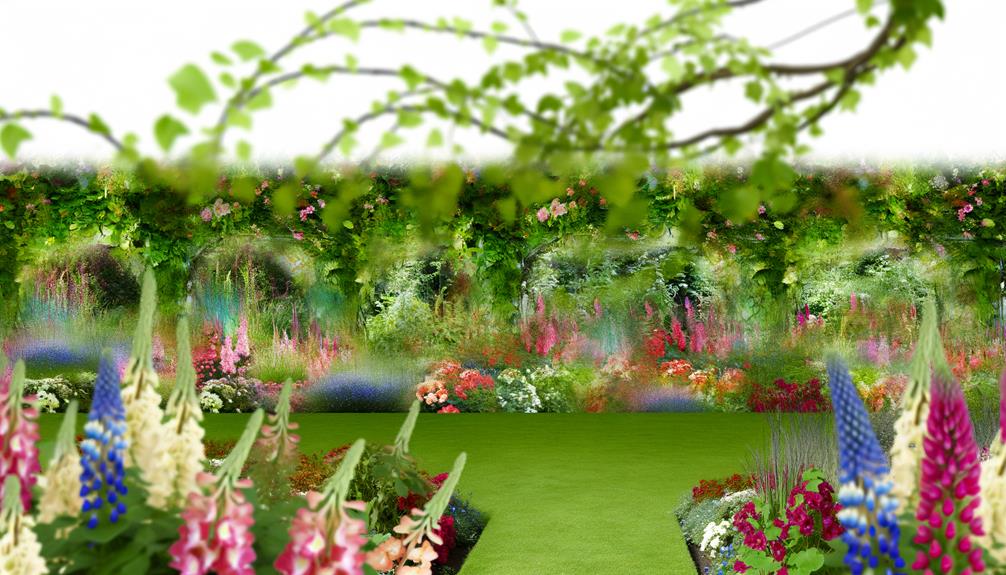Pallavi Name Meaning in English
The name Pallavi, originating from Sanskrit, means a new leaf or bud. It symbolizes growth, renewal, and the natural beauty of life's cycles.
Its root word, 'pallava,' suggests sprouting and blooming, reflecting positive transformation and continuous progress. Culturally, Pallavi embodies elegance and grace, holding significance in Indian music and dance as it represents thematic foundations and initial expositions.
This name is also celebrated in literature for its connotations of resilience and potential development. Due to its rhythmic and melodic qualities, it is gaining international usage, resonating well with contemporary values.
There is much to explore regarding its multifaceted significance.

Key Takeaways
- Pallavi means 'new leaf' or 'bud', symbolizing growth and renewal.
- It signifies positive transformation and the emergence of new life.
- The name carries connotations of beauty, vitality, and continuous progress.
- It holds cultural and literary significance, representing renewal and potential.
- Pallavi is integral to classical Indian music, reflecting intricate emotions and themes.
Origin of Pallavi
The name Pallavi originates from the Sanskrit language, which is one of the oldest and most classical languages of India. In Sanskrit, Pallavi is derived from the root word 'pallava,' which means a new leaf or bud. The term signifies growth, renewal, and the beauty of nature's cycle.
Importantly, Sanskrit is known for its rich vocabulary and precise meanings, and the word Pallavi is no exception. It encapsulates the essence of new beginnings and potential, commonly used in various contexts such as literature and classical music.
In addition, the phonetic structure of Pallavi, with its rhythmic and melodic qualities, adds to its appeal, making it a popular choice for names throughout generations.
Cultural Significance
Beyond its linguistic roots, the name Pallavi holds profound cultural significance in various aspects of Indian life, symbolizing renewal, beauty, and potential in traditions, arts, and personal identity.
In classical Indian music, 'Pallavi' is the thematic line of a song, representing the blossoming of melodic ideas. This mirrors the cultural notion of personal growth and evolution.
In Indian dance forms, Pallavi often denotes the initial exposition of rhythmic patterns, signifying the commencement of artistic expression.
Socially, the name is imbued with connotations of elegance and grace, often chosen for girls to reflect aspirations of beauty and virtue.
Consequently, Pallavi encapsulates a blend of cultural heritage and contemporary values, making it a name rich in meaning and significance.
Meaning in Sanskrit
In Sanskrit, 'Pallavi' is derived from the verb 'pallava,' meaning 'to sprout' or 'to bloom,' reflecting notions of growth and renewal. This etymological root underscores a theme of positive transformation and the emergence of new life.
The term 'pallava' is often used in classical Sanskrit literature to symbolize the tender shoots of plants, which denote the beginning stages of growth and the potential for future development. Such a meaning imbues the name 'Pallavi' with connotations of vitality and continuous progress.
It suggests an inherent dynamism, encapsulating both the promise of new beginnings and the beauty of natural evolution. This rich semantic background highlights the name's profound and multi-faceted significance in Sanskrit.
Musical Connection
The name Pallavi holds substantial importance in classical Indian music, serving as the thematic foundation in various compositions.
In this scenario, Pallavi refers to the initial lines of a song that encapsulate the core message and recurring motifs, thereby enriching the narrative structure.
Additionally, the symbolism embedded in Pallavi lyrics often reflects intricate emotions and philosophical themes, underscoring its role as an essential element in musical storytelling.
Classical Indian Music Origins
A significant aspect of the name Pallavi is its deep-rooted connection to classical Indian music, particularly in the context of the Carnatic and Hindustani traditions. Pallavi, derived from Sanskrit, symbolizes the blossoming or unfolding, which aptly reflects its role in music.
In classical compositions, the term Pallavi refers to the thematic line or the refrain that serves as the cornerstone of a musical piece. This term is integral to the structural framework of Indian classical music, providing a foundational motif around which improvisations and variations are built.
The origin of Pallavi in music underscores its cultural and historical significance, intertwining linguistic and artistic heritage in a manner that enriches both the name and its musical connotations.
Pallavi's Role in Compositions
Serving as the central thematic line, Pallavi in classical Indian compositions acts as the primary structural element around which the entire piece is developed and elaborated.
In Carnatic music, the Pallavi often sets the tone and introduces the raga's principal melody. This thematic line is repeated and explored through various rhythmic and melodic improvisations known as 'neraval' and 'kalpanaswaras.'
Its role extends beyond mere repetition; it anchors the composition, providing a stable foundation for elaborate musical exploration. Through intricate variations, the Pallavi demonstrates the performer's skill and creativity, making it a key component in both performance and composition.
This, it not only defines the piece's melodic framework but also showcases the artistic prowess of the musician.
Symbolism in Lyrics
Beyond providing a structural foundation, Pallavi's lyrics often carry deep symbolic meanings that connect listeners to broader themes and emotions in the composition.
The lyrical content of a Pallavi typically encapsulates the essence of the song, weaving intricate narratives and evoking profound emotional responses. Symbolism in Pallavi lyrics frequently draws on cultural, mythological, and spiritual references, enriching the musical experience.
These symbolic layers allow listeners to engage with the music on multiple levels, from appreciating the melodic and rhythmic elements to interpreting the deeper messages conveyed.
The Pallavi serves not only as a musical anchor but also as a vehicle for storytelling and emotional expression, fostering a rich, immersive listening experience.
Literary References
In various literary works, the name Pallavi often symbolizes renewal and growth, reflecting its meaning in the broader cultural context. This name appears in numerous texts, each time enriching the narrative with its inherent connotations of revival and new beginnings.
- Classical poetry: Pallavi is frequently used to illustrate the rejuvenation of nature, particularly in springtime.
- Modern novels: Authors employ Pallavi to denote characters who undergo significant personal transformation.
- Folklore: The name is often ascribed to heroines who embody resilience and regeneration.
- Dramas: Characters named Pallavi typically represent new hope or a fresh start.
- Children's literature: The name is used to inspire themes of growth and development.
Such literary references enhance the name's evocative power, embedding it deeply in the cultural consciousness.
Popularity and Usage
The name Pallavi has seen fluctuating levels of popularity over time, influenced by cultural trends and societal changes. In India, Pallavi is a name often associated with classical music and literature, leading to periods of increased usage when these fields gain prominence. Its popularity has also been shaped by regional preferences, with higher usage in states like Andhra Pradesh and Karnataka.
Although not as common in Western countries, the name has gained some traction among the Indian diaspora, reflecting a desire to preserve cultural heritage. Data indicates that the name's usage peaks during times of cultural renaissance, underscoring its deep-rooted connection to tradition and artistic expression.
Modern Interpretations
Modern interpretations of the name Pallavi often reflect a blend of traditional significance and contemporary relevance, highlighting its adaptability across different cultural and generational landscapes. This versatility is evident in how the name is perceived and embraced in modern contexts. For example, in India, Pallavi may be seen as a timeless and classical name, evoking the beauty and grace of classical Indian music and dance. In Western cultures, the name Pallavi may be appreciated for its uniqueness and exotic flair. Regardless of the specific interpretation, the meaning of the name Ramla adds an extra layer of depth and significance to the name, further enriching its appeal to a wide range of individuals.
- Cultural Resonance: It continues to maintain a strong cultural connection, often associated with Indian classical music and dance.
- Linguistic Elegance: The name's phonetic beauty makes it appealing in various languages and dialects.
- Symbolic Meaning: Pallavi, meaning 'new leaves' or 'blossom,' symbolizes growth and rejuvenation.
- Popularity in Media: Increasingly featured in literature, film, and television, enhancing its modern appeal.
- Global Acceptance: The name's ease of pronunciation and positive connotations contribute to its growing international usage.
These factors combined illustrate Pallavi's enduring and evolving significance.
Conclusion
The name Pallavi, rooted in Sanskrit, signifies budding leaves, symbolizing growth and renewal. Its cultural importance spans various domains, from classical Indian music to literary works, illustrating its deep-seated relevance.
The musical connection underscores its significance in Indian arts, while literary references highlight its poetic resonance. Popularity and usage have evolved, reflecting contemporary adaptations. Modern interpretations maintain the essence of its origin, showcasing its enduring legacy.
This multifaceted name continues to embody tradition, beauty, and cultural richness.






